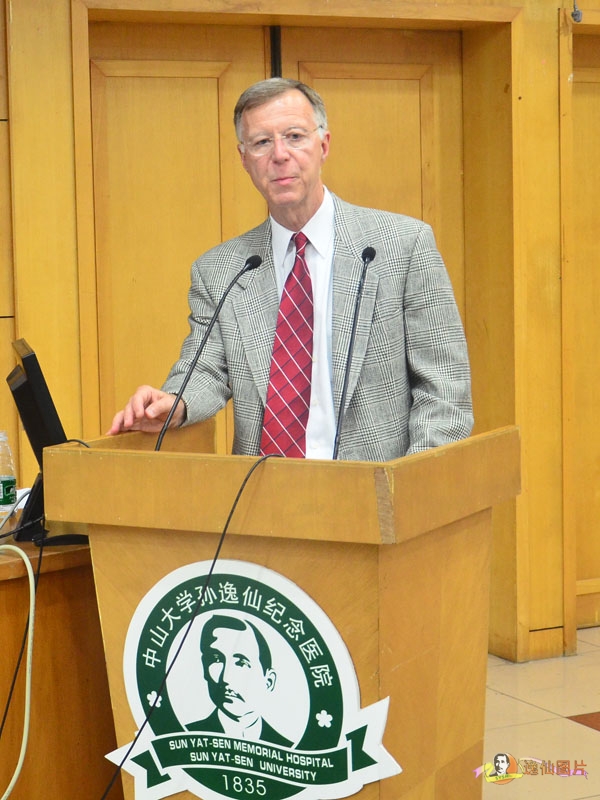Sun Yat-sen Memorial Hospital Invites Mayo Experts for Exchanges of Best Practice of Hospital Management
On the afternoon of May 9, Sun Yat-sen Memorial Hospital hosted an advanced seminar on Best Practice of Hospital Management by inviting two experts from Mayo Clinic to share their experience on running the world’s top medical institute. Mr. Carl T Rider, former Senior Administrator of Mayo Clinic, and Dr. Robert E. Safford, Honorary Director of Medicine at Mayo Clinic, attended the seminar and delivered speeches on Mayo Clinic’s management practice. The purpose of the seminar was to discuss how to improve public hospital’s management efficiency and service quality. More than 200 department chiefs at the hospital were attracted to the seminar.

Dr. Robert E. Safford
The seminar was divided into two sections. The first section began with Dr. Safford presenting his report on “Mayo Clinic: The World’s First and Largest, and One of the Most Successful Not-For-Profit Group Practices of Medicine”. By introducing the development of Mayo Clinic, Dr. Safford illustrated the distinct management system of Mayo Clinic and unveiled the importance of Mayo culture as a key factor for persistent development for more than a century. Following was Mr. Rider’s speech on “Mayo Clinic Management: The Role of Administrator and Systems and Procedures”. He focused on Mayo’s position setting and requirements for administrative expertise. By demonstrating different cases, he introduced the Mayo Clinic’s leadership partnership model and career development for hospital administrators. In particular, he mentioned an consultant department known as Systems and Procedures, which functioned as an enhancer for hospital’s management efficiency.
The second section of the seminar was composed of two speeches titled “Lessons Learned as a Physician Leader: The Good, the Bad!” and “From Quality Improvement to High Reliability: The Journey of Two Organizations”, which were presented by Dr. Safford and Mr. Rider respectively. As former chair of the Department of Medicine, Dr. Safford told from his experience about how to find the right people to hire. He also explained the retention system in Mayo and the decision that needed to be made for problem physicians. He emphasized the importance of communication between clinicians and administrators, and prompt response to medical mistakes. In Mr. Rider’s speech, he outlined the quality improvement tools and illustrated the principles and key points of high reliability, which was the guidance for high-quality medical institutes. Being the incumbent Senior Vice President of Via Christi Hospitals in Wichita, Mr. Rider applied his Mayo experience to the his current management practice at Visa Christi Hospitals, the largest hospital system in Kansas, and reviewed the effects of practice for the past 18 months.
The seminar ends with active exchanges between the two Mayo experts and the hospital practitioners on how to apply the Mayo experience to the management of China’s public hospital. Overall, it provides great opportunity to learn from advanced experience and methods on promoting public medical reform and improving hospital administrative system in areas of hospital development strategy, medical quality and patient safety, information technology, talent pool construction etc.
Mayo Clinic is a worldwide leader in medical care. In 2015, it was ranked as the No. 1 overall hospital by U.S. News and World Report. It has eight No.1-ranking specialties in the nation, which are diabetes and endocrinology, gastroenterology and GI surgery, geriatrics, gynecology, nephrology, neurology and neurosurgery, pulmonology, and urology. Mayo is ranked No. 2 in three additional specialties-cardiology and heart surgery, ear, nose and throat, and orthopedics and No. 3 in cancer. Its high-efficient management and patient care practice have won global recognition, and enjoyed high regards from both its patients and peers.


